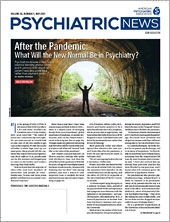As the director of physician well-being at Northwestern Medical Group, Gaurava Agarwal, M.D., considers one data point within the literature around worker burnout to be especially powerful. “The person who matters the most, by far, is the immediate supervisor,” he said. “One study showed that 50% of employee satisfaction at work is directly related to how they rate their immediate supervisor’s leadership skills.”
A program launching this spring by the APA Foundation’s Center for Workplace Mental Health is aiming to improve overall well-being in the workplace by working directly with supervisors and others who manage employees. Notice. Talk. Act. at Work is an internet-based learning course designed to teach participants how to recognize the signs of a potential mental health concern, talk to the employee about the concern, and connect the individual to services and supports.
“If we can influence this group to become better managers and supervisors, it can make a huge difference to worker mental health,” said Agarwal, who is a member of the Center for Workplace Mental Health’s Advisory Council and was involved in the development of Notice. Talk. Act. at Work.
The importance of improving mental health in the workplace has been gaining more attention in recent years, explained Darcy Gruttadaro, J.D., director of the Center for Workplace Mental Health. Depression is the number one cause of disability in the United States, yet, according to the center, more than 80% of employees report improved work efficacy and satisfaction when treated for their mental illness.
The center began developing Notice. Talk. Act. at Work in 2019 in response to the expressed need within the business community. The COVID-19 pandemic only further accelerated that need. U.S. adults have reported elevated symptoms of anxiety and depression due to the pandemic in numerous national surveys, including those conducted by APA (
Psychiatric News) and the Centers for Disease Control and Prevention (
Psychiatric News).
The Notice. Talk. Act. at Work training has already generated a great deal of interest, Gruttadaro explained, with more than 115 organizations seeking more information before the program has officially launched. Some companies that have expressed interest have upward of 50,000 employees.
The course is meant to be accessible, taking just 45 minutes to complete, while comprehensive. Participants can download 20 resources that cover an array of topics, such as suicide prevention, eating disorders, and family and medical leave, among others.
The training also includes scenarios that walk participants through the steps of what signs to notice, such as a change to an employee’s appearance, mood, or behavior. It outlines both internal changes (like procrastination, indecisiveness, not seeming to care about work, or wandering off topic) and external changes (like angry outbursts, attention-seeking behavior, or inappropriate verbal or nonverbal communication).
Then, the course outlines how supervisors can start conversations about what they have noticed. This is critical, Agarwal said. “Most people aren’t having these conversations because they don’t care; they’re not having them because they don’t know how,” he said. “Yet if they let that anxiety stop them from talking about mental health, it will result in a lack of action and perpetuate stigma. We wanted to remove that barrier and show them how they can have these conversations.”
The training encourages participants to ask open-ended questions, support the individual’s disclosure with affirmations, exhibit reflective listening by sharing what the individual has shared, and summarizing the conversations with agreements and next steps—collectively known as the OARS method. If managers are uncertain about whether or how to talk to an employee, they can confer with their human relations department.
Finally, the Act portion of the training walks participants through the appropriate resources to which they can connect employees, such as the human resources department, employee assistance programs, crisis response services, or external community resources.
“People spend so much of their lives at work so managers and co-workers often have a unique vantage point where they may be the first people to recognize someone is experiencing behavioral changes or symptoms of mental illness,” Agarwal said. “Knowing how to intervene early can lead to people seeking help earlier, which can decrease suffering and preserve high workplace performance.”
The benefits of improving mental health awareness in the workplace are numerous, Agarwal explained. “A big part of stigma includes the question of how is this going to impact people’s perceptions of me at work?” he said. “There’s a role for workplaces to play in addressing stigma by showing that they care and making it clear that it’s a sign of strength to seek help.” ■
Interesed members can access the training with a $100 donation to the APA Foundation. To learn more, visit the Center for Workplace Mental Health’s website
here or email Darcy Gruttadaro, J.D., at
[email protected].
“Transition in a Time of Disruption” is posted
here.

